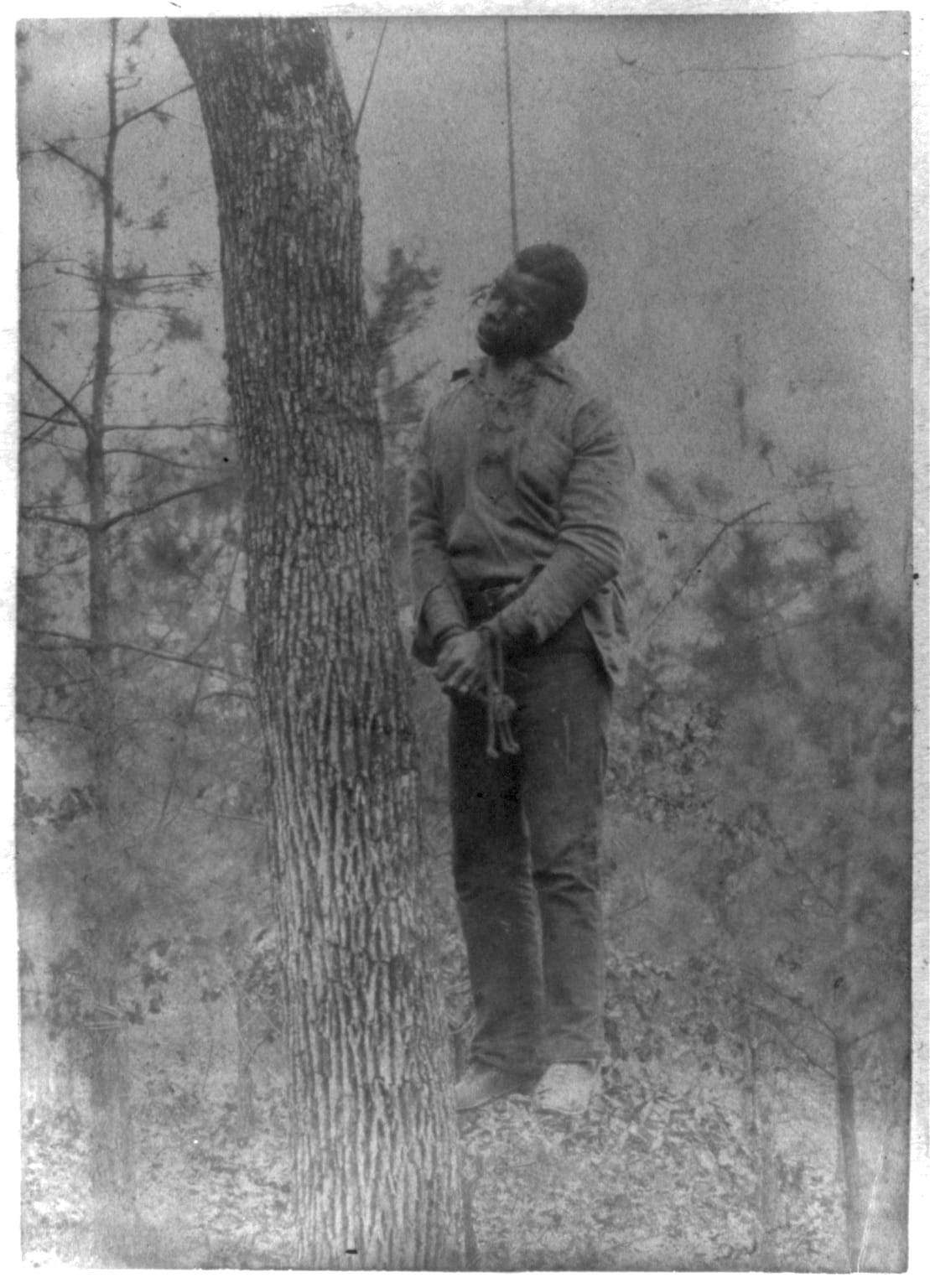
Book burning in the digital age
The right has long felt that some of our history needs adjustment. How far will they go?
On January 15, 1889, George Meadows died at the end of a rope in Alabama. The details are terrible, but they are better known than thousands of other documented lynchings between the 1880s and 1960s.
Among the few ways we remember what happened to Meadows is through the photograph of his hanged body, part of the perfectly-named American Memory Project of the Library of Congress.

The day before his murder, the white woman he was alleged to have raped said she could not be sure it was him. The day after his murder, the sheriff decided that Meadows didn't do it and arrested someone else for the crime.
The image now titled "Body of George Meadows, who was lynched after being falsely convicted of rape and murder, Jefferson County, Alabama" was originally inscribed "George Meadows, murderer & rapist, lynched on scene of his last crime."
At least one online archive still has the original defamatory title. But the American Memory Project of the Library of Congress serves as a touchpoint for the truth about George Meadows's murder, and thereby the practice of lynching that claimed an estimated 5,000 victims in the century following the Civil War, and thereby the larger history of racial injustice of which lynching was a part, and thereby the history of the US of which racial injustice is a part.
Remembering what happened to George Meadows is important for preventing it happening again.
Inconvenient truths
But what if the story of Meadows's death is inconvenient to a powerful and ascendant authoritarian political movement, one that has promised to purge both education and the culture of "wokeism"?
The word is never well defined, but it definitely overlaps with the story of racial unjustice, and lynching, and George Meadows.
The process of downplaying Black suffering has been underway for well over a century, from the "Lost Cause" ideology that painted slavery as a benevolent institution through which the enslaved "developed skills which, in some instances, could be applied for their personal benefit" to recent laws restricting how educators can discuss racism and its history—aka the Critical Race Theory Panic of 2021.
That political movement is about to take the reins of power in an unprecedented way, with fewer checks and balances than ever before. There is no reason to disbelieve their intention to act on their clearly stated plans, including "to muzzle woke propaganda" and to ensure "the woke agenda should be reversed and scrubbed from all policy manuals, guidance documents, and agendas."
Scrubbing a nation's memory of details that do not comport with the preferred self-image has been a high priority for authoritarians throughout history. For most of that history, this would amount to the confiscation and destruction of physical documents, books, icons, art, photographs, and other containers of memory—a process often distilled to the term "book burning."
The destruction of texts and images was easiest, and the eradication most thorough, when these things existed mostly in single copies. Qin Shi Huang's purge of Confucianism, Wuzong's purge of Buddhism, the Byzantine iconoclasts, and Pope Innocent III's war on the Albigensians all benefited from the low number and high combustibility of offending materials. Gutenberg scaled up the process of collection for authoritarians from the Spanish Inquisition on, but the basic concept was the same—find the physical conveyors of inconvenient ideas and end them.
What might book burning look like in the digital era?
Obeying in advance
On the first page of his 2017 book On Tyranny, historian Timothy Snyder offers the first rule for responding to authoritarian rule: Do not obey in advance.
Before Nazi Germany officially annexed Austria, many Austrians began persecuting Jewish citizens and aligning with Nazi policies without having been ordered to do so. During Stalin’s purges, many local officials "over-complied," exceeding quotas for arrests or executions to demonstrate loyalty. A number of film studios voluntarily blacklisted people suspected of community sympathies before they were ordered to do so. After the post-9/11 Patriot Act was passed, many Americans began voluntarily reporting their neighbors or co-workers for "suspicious" behavior, usually based on racial or religious profiling.
Obedience in advance of Trump II is already in evidence. When Jeff Bezos refused to allow the Washington Post editorial board to endorse Kamala Harris, he said it was to preserve objectivity. Others said he was protecting his own tax breaks.
I think the real answer is clear: Worried about the wrath of a future tyrant, Bezos was obeying in advance.
And when US Archivist (and Biden appointee) Colleen Shogan altered planned exhibits at the popular National Archives Museum, ordering the removal of references to the displacement of indigenous tribes and the forced internment of Japanese-Americans during World War II, she was not acting on her own expertise as a professional archivist and curator. She was anticipating the demands of a possible incoming administration. As the Wall Street Journal put it, "Shogan and her senior advisers also have raised concerns that planned exhibits and educational displays expected to open next year might anger Republican lawmakers—who share control of the agency’s budget—or a potential Trump administration." So they obeyed in advance.
The photo of George Meadows is part of the inconvenient story of Black suffering that runs through our national history. A political movement that has long sought to eradicate "wokeness" from the classroom, our history, and even our memories, will have a lot of work to do.
Their load will be lightened by obedience in advance.
Encouraging a nation to forget
A thought experiment. Suppose they try to do exactly what they have promised to do: scrub American history clean of anything that casts an unfavorable light.
Imagine you are Stephen Miller. Your main portfolio in the new administration is homeland security, but you're also deputy chief of staff for policy and an enthusiastic white nationalist. It won't take much to fit scuttling the woke agenda into your purview.
As a trial project, you decide to work on downplaying the history of lynching. You will never be able to erase the record entirely, but it's certainly possible to fade the cultural memory.
Lynchings have been documented in many ways. Many were covered in local and national newspapers. There are coroners' reports, police investigations, and court documents, as well as testimonies from survivors, descendants, and witnesses. But nothing is as indelible as an image. Getting rid of photographic evidence of lynching would go a long way to turning indelible memory to a vague recollection.
Most of the photographic evidence is centered on the digital collections of the Library of Congress, so we'll start there. It's all in the public domain—a network of imagery in museums and histories and textbooks, keeping the memory of lynching alive. Let's revert the copyright status to All Rights Reserved for all relevant images, then issue cease-and-desist notices to all current users, maybe starting with the 199 online uses of the George Meadows image.
The librarian of Congress is in charge of copyright terms and enforcement, and current librarian Carla Hayden—the first woman, first African American, and first professional librarian to serve in the role—may be unwilling to comply. She has two more years on her 10-year term, but as a presidential appointee, she can be fired by the president.
Once the restrictive copyrights are in place, go back to the Library of Congress digital collections and order wholesale deletions, entire collections of images, newspapers, videos, to restore a positive patriotic narrative.
Depending on how far along the path we are, a cover story might be helpful. Send an internal memo. A routine review found tens of thousands of images in the LOC collection that had been altered or generated by AI. We are in the process of removing these counterfeits, thank you for your patience, etc. Then decimate the record not only of lynchings but of scores of other inconvenient narratives.
That's a book burning in the digital age. Yes, it can be done. It would be one hell of an undertaking, but it is by no means impossible nor even terribly unlikely.
If it seems ludicrous, that may be your American exceptionalism talking. This is an excellent time to stop thinking of the United States as magically vaccinated against the excesses of autocracies elsewhere, including many that rose out of democracy. Excesses like the wholesale revision of national history may or may not end up happening here. But anything that has happened elsewhere absolutely can happen here.
—Project 2025 (p. 9)
